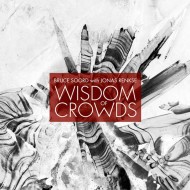 The progressively-orientated Kscope label has an impressive roster of bands, including Anathema, Porcupine Tree and The Pineapple Thief. The latter’s main man Bruce Soord has now entered into collaboration with Katatonia’s Jonas Renske for “Wisdom of Crowds”. When I heard of this, I wasn’t sure how this was going to work. Both are top musicians who know how to create evocative atmospheres. I envisaged the prospect of drowning in gloom and cynicism. The input sounded a bit yin and yin, but it’s intriguing.
The progressively-orientated Kscope label has an impressive roster of bands, including Anathema, Porcupine Tree and The Pineapple Thief. The latter’s main man Bruce Soord has now entered into collaboration with Katatonia’s Jonas Renske for “Wisdom of Crowds”. When I heard of this, I wasn’t sure how this was going to work. Both are top musicians who know how to create evocative atmospheres. I envisaged the prospect of drowning in gloom and cynicism. The input sounded a bit yin and yin, but it’s intriguing.
“Wisdom in Crowds” is broadly what I would have expected from these two. This is a collection of substantial songs, marked by edgy lyrics which are plastered with the vagaries of personal relationships, uncertainty, regret and the constant undercurrent of delusion and the suggestion of failed aspirations: “if anyone asks how the story goes, just pretend we’re almost there … just pretend it’s safe and warm”. Renske’s first person narratives are plaintive and reeking of vulnerability. Meanwhile Mr Soord provides gentle acoustic sections and brief explosions of prog metal but as on The Pineapple Thief albums, there are waves of sound which run through the core. A particular feature is the use of electronic beats and rhythms throughout the album, as if Depeche Mode have dropped by for a jam session.
It all starts with the sound of a ticking clock. “Pleasure” builds up spookily. Renske’s unmistakeable voice strikes up. He aims straight through the heart with his personalised and chilling words: “Get on your knees, I’ll show you pain … I am your pleasure so you will know”. Pleasure of course is a threat. It couldn’t be good. This is all played out to a funky, house-style rhythm and instrumental delicacy as Renske delivers his plaintive and clear message. The title track then follows. It is understated. The drum pushes it along nicely, accompanying the exotic guitar rhythm. A guitar solo softly adds breadth. “Look at how they suffer”, explains Renske.
Mr Soord likes to play with sound. This is where he resembles his Kscope peer Steven Wilson. “Radio Star” has a kind of house beat again. The production is heavy as the vocals are fuzzy. Then it goes clear for the message: “I am the sun, I am the moon, I am the day that broke too soon”. The fuzziness returns and in a logical twist, we head off towards the cosmos. “Frozen North” starts in orchestral vein with sad violins and acoustic touches. The instrumental movement sways between the soft and sad acoustics and a brief explosion of prog metal. But what else could this finely structured song be but chilling? As we enter “The Light”, Renske’s delivery is quiet and penetrating like an arrow in the heart. This song is segmented but it works. The drum is at the centre and there’s the occasional prog explosion as electro sounds creep furtively in the air. The electro sound starts and ends the track. It could have gone on a little at the end and indulged us, I thought. The strangest song is “Stacked Naked”. The lively electro-techno beat gives it the air of a pop song. It was the theme of the song which hooked me. There’s a tone of defiance as Renske narrates his tale of failure and self-analysis: “Don’t say you have left me … I can’t believe it’s true, I am here instead of you”. Someone should write a thesis about the subject of “Self-Doubt in the work of Jonas Renske”. “Pretend” takes the level of introspection further. It’s gloomy but brightened up by smooth and rich instrumentals. “This is my life” is a typically gloom-coated, reflective line on “Centre of Gravity”. Orchestral sadness again matches the gloom and the personal fears. There is a quiet, pattering beat. The song is so dark as to be almost stagnant. It descends into an almost trance-like state. “Hold out your hand … these are our fears”. Life seems to return with the electro beat of “Flows Through You”. It’s a bit strong. Renske delivers his message purposefully and thought-provokingly as usual. An electro bass line follows. There’s a hypnotically spooky depth about this. It’s like a sound riot but I found it too sharp and didn’t really like this track which ends this interesting album.
I often used to read on packaging what you should do “if you are not completely delighted with this product”. For me there’s an element of this here. I’ve listened to “Wisdom of Crowds” about eight or nine times, and there are some wonderful moments but it didn’t gel. It has many great qualities, not least Renske’s expressions of loss, failure and retrospective reflection and Soord’s immaculate acoustics and progressive creativity. But I also felt there was an incompatibility at times between the thematic and vocal moods on the one side and on the other the instrumental work, which was too happy, inappropriately off-the-wall and more fitting of something else. The Pineapple Thief and Katatonia do it so much better. The electronic elements in particular could be effective when used as support but also detracted from the atmosphere in parts of the album, resulting in conflicting wavelengths and the loss of a little of its edge and direction. “Wisdom of Crowds” is still an imaginative work but not so exceptional as to explode my brain.
(6.5/10 Andrew Doherty)
www.kscopemusic.com/wisdomofcrowds

Leave a Reply